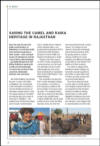Rolex journal features work in Rajasthan

The Winter 2004-2005 issue of the Rolex Awards for Enterprise journal For Enterprise features the work of LPP founder Ilse Köhler-Rollefson in Rajasthan. It highlights the camel yatra that Ilse and members of the NGO Lokhit Pashu-Palak Sansthan launched in January 2005 to draw attention to the declining numbers of camels in Rajasthan, and the threat this brings to their traditional Raika herders.
Ilse received an Associate Laureate award from Rolex in 2002 for her work with the Raika.
Endogenous Livestock Development email group
The ELDev discussion group enables members to exchange ideas and information on “endogenous livestock development“. This is a people-centred approach that focuses on the development of livestock production, based on livestock keepers’ initiatives, their own worldview, values, knowledge, institutions, and locally available resources, as well as suitable outside resources.
The group started as a discussion group on ethnoveterinary medicine, but has recently expanded to cover broader aspects of people-centred livestock development. The group has over 200 members.
To join the ELDev group, visit http://groups.yahoo.com/group/ELDev or send a blank email to ELDev-subscribe@yahoogroups.com
Tierhalterrechte

The League for Pastoral Peoples booklet, Livestock Keepers’ Rights: Conserving breeds, supporting livelihoods (see below), has been published in German as Tierhalterrechte: Nutztierrassen erhalten, ländliche Existenzen bewahren.
Download English version 262 kb, 20 pages.
Download 276 kb, 20 pages.
Contact info@pastoralpeoples.org for a free hardcopy.
